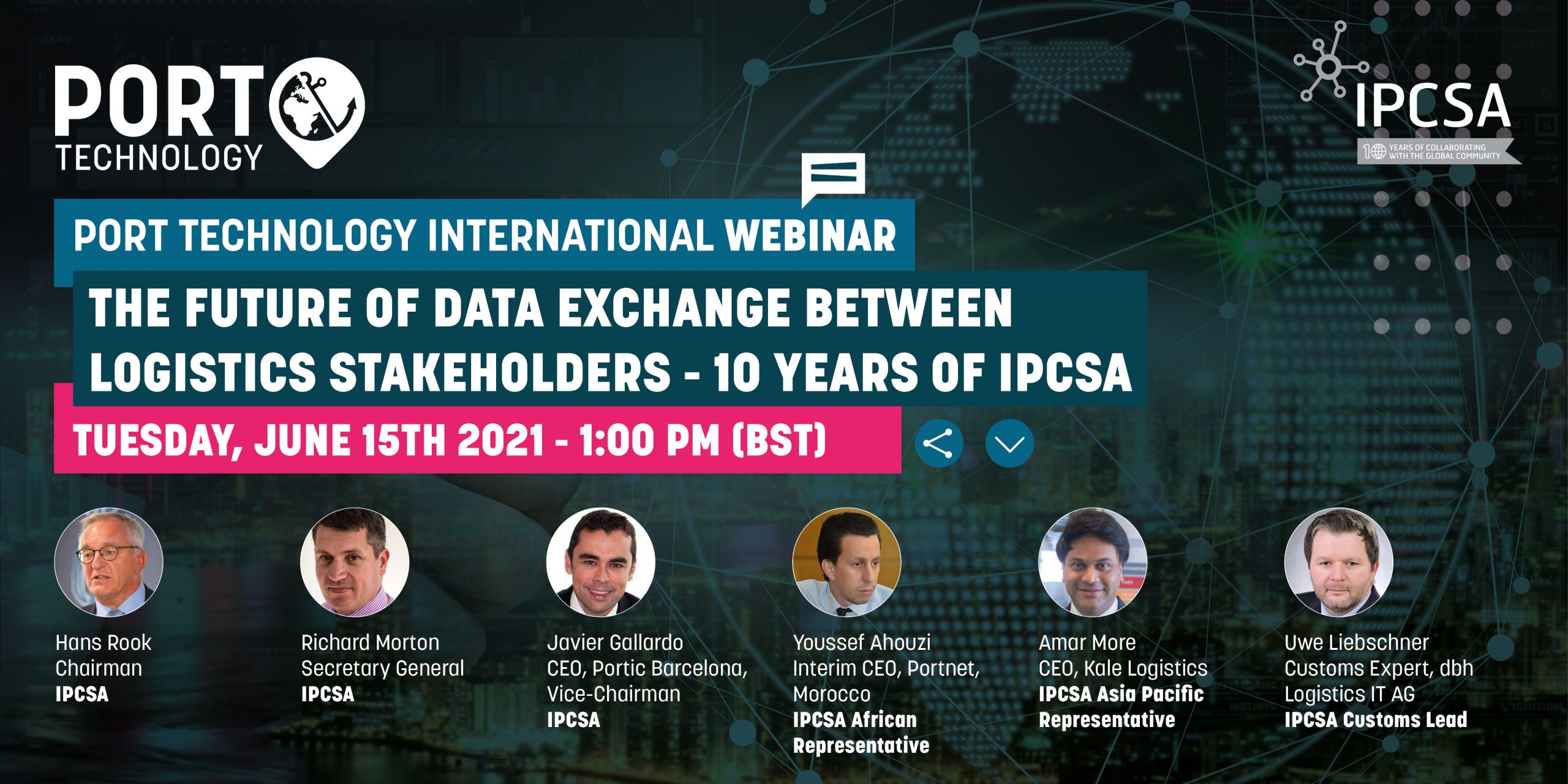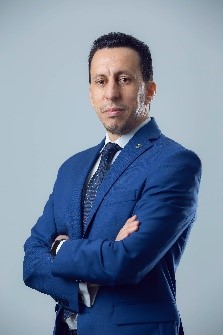
IPCSA 10th Anniversary Webinar Summary
The remarkable achievements and advances of the International Port Community Systems Association (IPCSA) were celebrated by members and supporters at a special Tenth Anniversary Webinar held in partnership with Port Technology International magazine.
Speakers reflected on IPCSA’s transformation from a small European lobbying group founded in June 2011 to a truly international association which is recognised and valued across the globe for providing advice and guidance on the electronic exchange of information across borders and throughout the whole supply chain.
And yet – IPCSA’s primary focus is always on its members. Members are proud to be part of the ‘IPCSA family’.
This ‘family’ aspect was clear throughout the webinar, as speakers and members expressed their shock and sadness at the loss of a dear friend, colleague and IPCSA member, Dominique Lebreton, member of the executive board at the French Port Community System specialist MGI. He died on 12 June in a tragic road accident, aged 49.
A minute’s silence was held for Dominique before the webinar began. “Dominique was not only a business partner but especially a friend. We are all shocked by this news,” said Hans Rook, chairman of IPCSA. “Our thoughts are with his family and all at MGI.”
Javier Gallardo, CEO of Portic and vice-chairman of IPCSA, added: “Dominique was a dear friend. We have lost one of us.”
Uwe Liebschner, customs expert at dbh Logistics, said: “We are a real family. When I first met Dominique, we had a relaxed evening with a lot of funny moments. He was what IPCSA stands for, and what we can all be proud of. We are experts in the field, like Dominique. We are relaxed and positive people, like Dominique. We have fun together, at the right time – yes, like Dominique. He will stay in our hearts and will remain a part of our family.”
IPCSA started out with six founding members, all European-based Port Community Systems. Now it has nearly 50 members, including Port Community System and Cargo Community System operators, Port Authorities and Single Window operators. More than 500 million TEU go through IPCSA members’ systems on an annual basis.
 “Our members represent about 500 sea ports and airports,” said Hans Rook.
“Our members represent about 500 sea ports and airports,” said Hans Rook.
But size is only one aspect – IPCSA’s role has changed and adapted during the past ten years, said IPCSA secretary general Richard Morton. “We were formed in order to work with the European Commission and its 2010/65 Maritime Single Window Directive. But since then we have expanded, covering all aspects of the world and all modes of transport, and we work actively in promoting the neutrality and transparency of Port Community Systems, Cargo Community Systems and Single Windows around the world. We are a community of communities.”
Today, IPCSA is a recognised NGO (non-governmental organisation) with consultative status at the International Maritime Organization and UNECOSOC, and works closely with UN/CEFACT, the World Customs Organization, the ISO and several other international bodies.
Technology has also evolved rapidly, with members embracing technologies including blockchain and API, said Richard Morton.
“As IPCSA, we are focusing on our Network of Trusted Networks (NoTN), a global and scalable connection which is about sharing data across borders in an easy and simple way. In order to support the global logistics community, we need to support the sharing of data across borders.”
 Blockchain technology is disrupting and shaping global trade, said Javier Gallardo, as he discussed advances in the field of data exchange. At the same time, the typical architecture for messaging is evolving, as is the way in which the data is being accessed. “In the past we had PCs and servers; now mobiles are taking a bigger share. In the future, any device connected to the internet will be the source of information, and this will be managed and delivered by Port Community Systems,” he said. “4G and 5G are providing real connectivity to information and trade. The volume of data is increasing every day – we are talking about huge volumes of data transactions. “
Blockchain technology is disrupting and shaping global trade, said Javier Gallardo, as he discussed advances in the field of data exchange. At the same time, the typical architecture for messaging is evolving, as is the way in which the data is being accessed. “In the past we had PCs and servers; now mobiles are taking a bigger share. In the future, any device connected to the internet will be the source of information, and this will be managed and delivered by Port Community Systems,” he said. “4G and 5G are providing real connectivity to information and trade. The volume of data is increasing every day – we are talking about huge volumes of data transactions. “
Youssef Ahouzi described PortNet as ‘an accelerator of business competitiveness’, explaining the way in which Single Windows can drive the integration of the supply chain and stimulate international, inclusive trade. “The future of Single Windows is technology, globalisation and integration,” he said. “We are in the Fourth Industrial Revolution and technology is evolving faster than ever. Companies and individuals that don’t keep up with the major tech trends run the risk of being left behind. Single Windows, amongst others, should prepare for and grasp the opportunities – including Blockchain, AI, big data, analytics, machine learning and the Internet of Things.”
He agreed that platforms need to be connected: “The shared ambition is to continue to simplify and to integrate more effectively the international trade value chain and door-to-door services for all shipments. The Network of Trusted Networks is one of the solutions for Single Windows to globalise.”
Meanwhile, where the focus was historically on port optimisation, today Port Community Systems must expand their focus dramatically, said Javier Gallardo. “We were talking ‘domestic’ but in the future we have to think of global optimisation. The demands of the market are for door-to-door traceability from end to end. That requires synchronisation, traceability, standardisation and globality. Today we also integrate and automate our systems to be more efficient – and in the future we will focus more on integration, automation and optimisation.
He also predicted the advance of AI and machine learning so that decisions made by humans today could be made more efficiently by machines in the future – such as the best route or means of transport to choose, based on information received.
 However, humans are still crucial to the overall picture – in his presentation about Cargo (Air) Community Systems, Kale Logistics CEO Amar More explained how Kale takes along less tech-savvy users on the journey to data exchange. Some people are still using typewriters for airbills, or very old legacy IT systems and were reluctant or unable to access the portal or develop APIs, he said. Kale’s solution is to use AI and machine learning to extract data from PDF documents and move this across to the system. “So there is something we can do for all those ‘have nots’ of technology, and try to lift them a little bit.”
However, humans are still crucial to the overall picture – in his presentation about Cargo (Air) Community Systems, Kale Logistics CEO Amar More explained how Kale takes along less tech-savvy users on the journey to data exchange. Some people are still using typewriters for airbills, or very old legacy IT systems and were reluctant or unable to access the portal or develop APIs, he said. Kale’s solution is to use AI and machine learning to extract data from PDF documents and move this across to the system. “So there is something we can do for all those ‘have nots’ of technology, and try to lift them a little bit.”
Skills and skills shortages are a challenge across ever aspect of the logistics industry, he warned. “We need to work very closely with academia in different countries and on an international level and come up with short-term courses that can give people a peak into digital and technology.”
A recurring theme in the webinar was the need to continue moving forward: “In order to stay the same, you have to change,” is the IPCSA motto.
“Times are changing – and we need to change,” said Amar More. “When digitisation started in the air cargo space, the platforms in the early days were essentially facilitating digital transactions between freight forwarders and airlines, or airlines and customs. Now the focus is shifting from broad-based Cargo Community Systems facilitating a couple of transactions, to creating communities around the airport. IPCSA is helping to drive future innovation in the air cargo industry, for sure.”
There is so much to be achieved in order to reduce bottlenecks, deliver real-time visibility, provide advance information and harmonise processes in air cargo operations, he added: “Air cargo stays on the ground for 85% of the time. So there is so much value to be unlocked through digitalisation and community platforms for air cargo. The next generation air cargo systems definitely have to do more. There will be benefits for freight forwarders, customs brokers, cargo ground handling agents, airlines, truckers and the shipper/consignee.”
Javier Gallardo warned: “If you don’t put your business into the digital world, in a few weeks or months you will be out of the game – this is something we should realise clearly.”
 Youssef Ahouzi agreed: “Keeping up with new technology is very important for the logistics industry and the supply chain. If it is not done, we can rapidly be out of the game. We see a lot of new players coming in looking to see their technology to customers.”
Youssef Ahouzi agreed: “Keeping up with new technology is very important for the logistics industry and the supply chain. If it is not done, we can rapidly be out of the game. We see a lot of new players coming in looking to see their technology to customers.”
Kale Logistics, which is also celebrating its tenth anniversary this year, is proud to be part of IPCSA, which is a ‘phenomenal and pioneering’ organisation, said Amar More.
IPCSA and its members are recognised as knowledgeable, supportive, constructive trusted partners for all stakeholders, private and public, and not only in their own environment, said Uwe Liebschner. “We are recognised amongst the leading organisations and institutions as a valuable partner.”
not only in their own environment, said Uwe Liebschner. “We are recognised amongst the leading organisations and institutions as a valuable partner.”
Discussing IPCSA’s work with the European Union’s DG Taxud, he added: “Since I joined IPCSA in 2013, we have attended I don’t know how many work groups and meetings to bring in our practical experience and I can tell you the truth – the Commission likes us. Not only because we are nice people, but we came at the right time when the customs organisations in Europe started to go on their way to the next level of digitalisation and implementation of new electronic systems. It was the right time for IPCSA to come into the game and give some experience from the field to the Commission.”
In every meeting that IPCSA is invited to, ‘community’ is key, he said. “Community in the meaning of business, yes – but IPCSA has moved on to the next level, from community approach to really being a family. We, dbh, are proud to be part of that family and look forward to common ideas for shaping the future together in the family. And I give my personal thanks to the heart of the family, who is Richard Morton.”
For more information please contact Richard Morton, IPCSA, Secretary General



